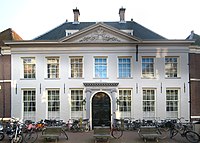Heeren XIX

The West India House on the Herenmarkt in Amsterdam, headquarters of the WIC from 1623 to 1647
|
|
| Founded | June 3, 1621 |
|---|---|
| Founder | Willem Usselincx (among others) |
| Defunct | 1792 |
|
Number of locations
|
Amsterdam, Hoorn, Rotterdam, Groningen and Middelburg |
|
Key people
|
Heeren XIX |
Dutch West India Company (Dutch: Geoctroyeerde Westindische Compagnie, Dutch pronunciation: [ɣəʔɔktroːˈjeːrdə ʋɛstˈɪndisə kɔmpɑˈɲi] or Dutch: GWIC; English: Chartered West India Company) was a chartered company (known as the "WIC") of Dutch merchants as well as foreign investors. Among its founders was Willem Usselincx (1567–1647). On June 3, 1621, it was granted a for a trade monopoly in the Dutch West Indies by the Republic of the Seven United Netherlands and given jurisdiction over Dutch participation in the Atlantic slave trade, Brazil, the Caribbean, and North America. The area where the company could operate consisted of West Africa (between the Tropic of Cancer and the Cape of Good Hope) and the Americas, which included the Pacific Ocean and the eastern part of New Guinea. The intended purpose of the charter was to eliminate competition, particularly Spanish or Portuguese, between the various trading posts established by the merchants. The company became instrumental in the largely ephemeral Dutch colonization of the Americas (including New Netherland) in the seventeenth century. From 1624-1654, the WIC held Portuguese territory in northeast Brazil, but they were ousted from Dutch Brazil following fierce resistance.
...
Wikipedia
